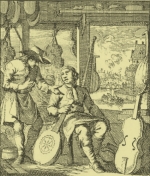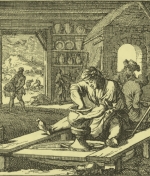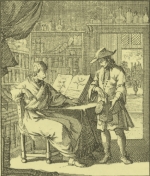Social context
Science is sometimes done today by people working in isolation for long periods of time. However, it is usually done with others, in groups and teams, regardless of nationality or social standing.
- The equipment is complex and expensive.
- Trained researchers are rare and expensive.
- Massive amounts of data are often processed over long periods of time.
- Accountability to funding organizations is time-consuming and expensive.
Four hundred years ago, however, conditions were very different. As Leeuwenhoek, Huygens, Hooke, Boyle, and many others showed with their wide array of clever, creative experiments:
- the equipment can be hand-made
- the researchers can train themselves
- the data can be processed with pencil, paper, and arithmetic
Looking at the incomplete, messy record of the early Royal Society supplemented by Hooke's newly found Folio, we can see that accountability even then met the natural resistance of the creative human mind to pay attention to the recent past. The immediate future is too interesting.

The idea here is that the group as a whole is smarter than any individual. The group has more and better information, as a whole, and will tend to make better decisions. Scientists who work together benefit from a group creativity during the process compared to the benefit that they get from journal articles that are always lagging the research, often by years because of time-consuming peer review.
Leeuwenhoek stayed in Delft, wisely preserving his independence and autonomy. He made his own glasses and prepared his own specimens. He trained himself because there was no one who had ever done what he was doing, seeing what he was seeing with the equipment that he was using. With a crayon to draw what the lens revealed and a pencil to work out the arithmetic, Leeuwenhoek had all the data processing tools available.
He was friends with the doctors, politicians, lawyers, and wealthy residents of Delft. Leading Dutch scientists visited and corresponded with him. He corresponded with people in several different countries about his research interests, and many foreigners visited him. He was the most famous person in Delft through most of his adult life. As documented by his letters on the No Longer Any Doubt page, he offered criticism and responded to criticism by his neighbors and skeptics as well as by some of the leading minds of his day all over Europe. He was a proud Fellow of the most prestigious society of experts and the most frequent contributor to their journal.
While Leeuwenhoek worked alone, he did not think alone.
Conclusion
To many, Leeuwenhoek is not considered among the first rank of scientists because he was an "amateur". He did not have the mind of a theoretician like Newton.
But neither did anyone else at the time. Leeuwenhoek died when Linnaeus was still a teenager in Sweden. Newton himself was an alchemist, the kind of distraction that never seemed to even cross Leeuwenhoek's literal, commonsensical mind. He published everything, and no one else was able to look at the in the voluminous observations and synthesis and theorize about the evidence. Today, a dozen different scientific disciplines claim Leeuwenhoek as a "father". Was he supposed to have had the foresight to create all of those disciplines himself?
As one example, it was almost two centuries after Leeuwenhoek's first reporting of the little animals "prettily a-swimming" before they were synthesized and theorized into threatening germs in the wake of the discoveries of Louis Pasteur, Joseph Lister, and Robert Koch.
Leeuwenhoek was as much a scientist as anyone of his time. He held and practiced the values of empiricism, objectivity, and openness. He willingly participated in the validation of his claims. He changed his ideas based on new evidence. He was for half a century an important participant in what we now call the Scientific Revolution and the Enlightenment.















